Ethical Decision Making and Leadership: A Critical Analysis
VerifiedAdded on 2023/06/12
|15
|3781
|149
AI Summary
This essay critically analyzes the concept of ethical decision making and ethical leadership. It also discusses the necessary skills and personality traits required for good ethical decision making. The essay includes a development plan based on the outcome of three questionnaires and a SWOT analysis. The subject is Project Management.
Contribute Materials
Your contribution can guide someone’s learning journey. Share your
documents today.

Project Management
Secure Best Marks with AI Grader
Need help grading? Try our AI Grader for instant feedback on your assignments.
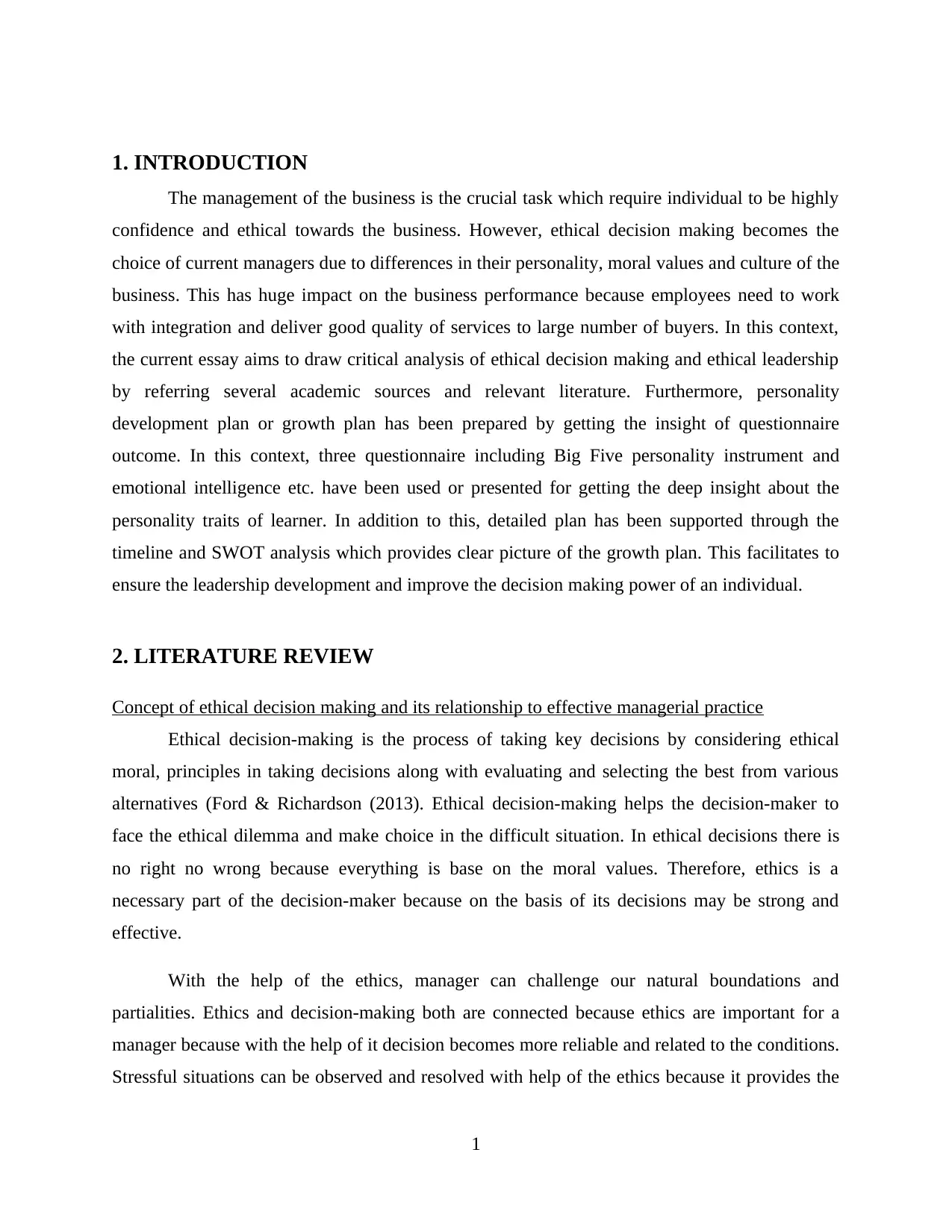
1. INTRODUCTION
The management of the business is the crucial task which require individual to be highly
confidence and ethical towards the business. However, ethical decision making becomes the
choice of current managers due to differences in their personality, moral values and culture of the
business. This has huge impact on the business performance because employees need to work
with integration and deliver good quality of services to large number of buyers. In this context,
the current essay aims to draw critical analysis of ethical decision making and ethical leadership
by referring several academic sources and relevant literature. Furthermore, personality
development plan or growth plan has been prepared by getting the insight of questionnaire
outcome. In this context, three questionnaire including Big Five personality instrument and
emotional intelligence etc. have been used or presented for getting the deep insight about the
personality traits of learner. In addition to this, detailed plan has been supported through the
timeline and SWOT analysis which provides clear picture of the growth plan. This facilitates to
ensure the leadership development and improve the decision making power of an individual.
2. LITERATURE REVIEW
Concept of ethical decision making and its relationship to effective managerial practice
Ethical decision-making is the process of taking key decisions by considering ethical
moral, principles in taking decisions along with evaluating and selecting the best from various
alternatives (Ford & Richardson (2013). Ethical decision-making helps the decision-maker to
face the ethical dilemma and make choice in the difficult situation. In ethical decisions there is
no right no wrong because everything is base on the moral values. Therefore, ethics is a
necessary part of the decision-maker because on the basis of its decisions may be strong and
effective.
With the help of the ethics, manager can challenge our natural boundations and
partialities. Ethics and decision-making both are connected because ethics are important for a
manager because with the help of it decision becomes more reliable and related to the conditions.
Stressful situations can be observed and resolved with help of the ethics because it provides the
1
The management of the business is the crucial task which require individual to be highly
confidence and ethical towards the business. However, ethical decision making becomes the
choice of current managers due to differences in their personality, moral values and culture of the
business. This has huge impact on the business performance because employees need to work
with integration and deliver good quality of services to large number of buyers. In this context,
the current essay aims to draw critical analysis of ethical decision making and ethical leadership
by referring several academic sources and relevant literature. Furthermore, personality
development plan or growth plan has been prepared by getting the insight of questionnaire
outcome. In this context, three questionnaire including Big Five personality instrument and
emotional intelligence etc. have been used or presented for getting the deep insight about the
personality traits of learner. In addition to this, detailed plan has been supported through the
timeline and SWOT analysis which provides clear picture of the growth plan. This facilitates to
ensure the leadership development and improve the decision making power of an individual.
2. LITERATURE REVIEW
Concept of ethical decision making and its relationship to effective managerial practice
Ethical decision-making is the process of taking key decisions by considering ethical
moral, principles in taking decisions along with evaluating and selecting the best from various
alternatives (Ford & Richardson (2013). Ethical decision-making helps the decision-maker to
face the ethical dilemma and make choice in the difficult situation. In ethical decisions there is
no right no wrong because everything is base on the moral values. Therefore, ethics is a
necessary part of the decision-maker because on the basis of its decisions may be strong and
effective.
With the help of the ethics, manager can challenge our natural boundations and
partialities. Ethics and decision-making both are connected because ethics are important for a
manager because with the help of it decision becomes more reliable and related to the conditions.
Stressful situations can be observed and resolved with help of the ethics because it provides the
1
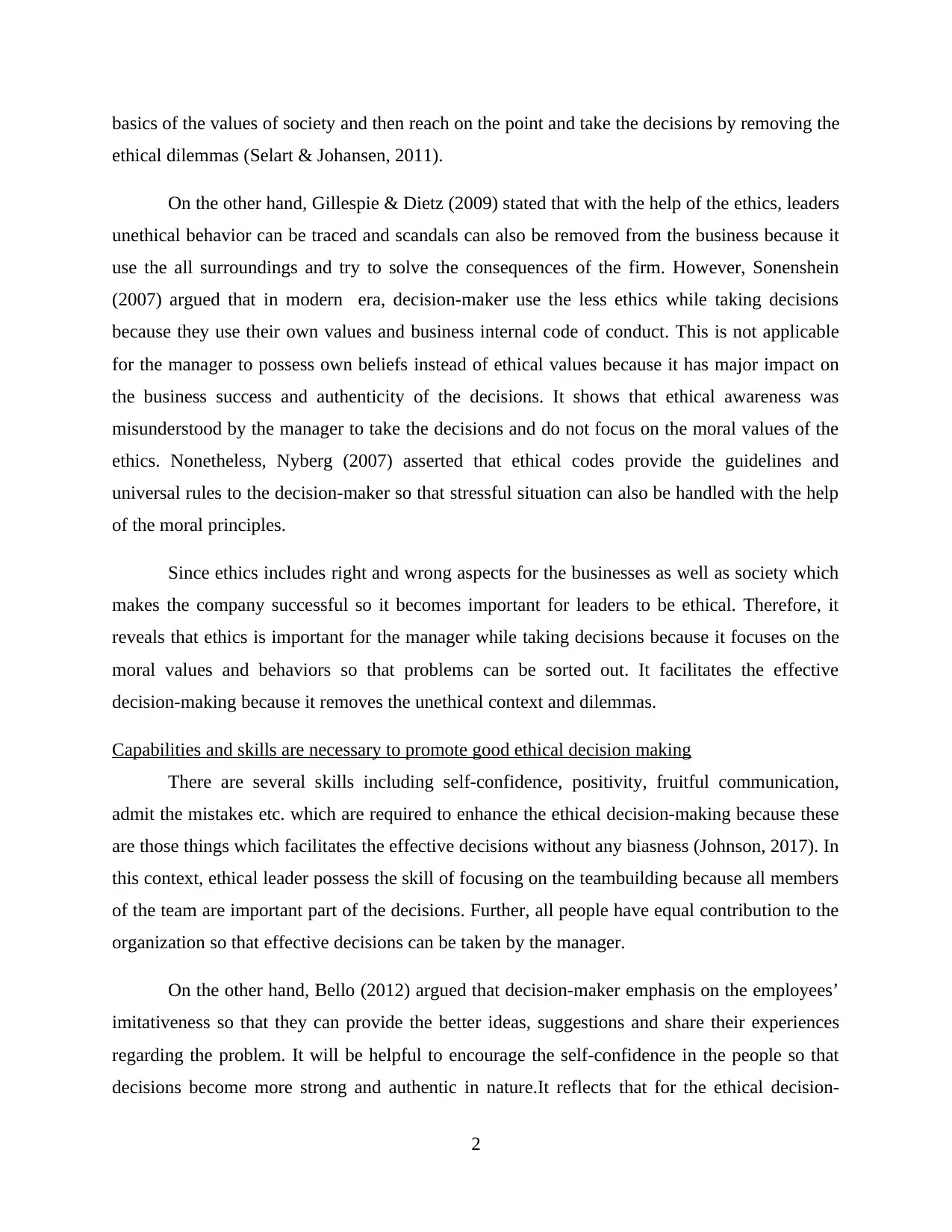
basics of the values of society and then reach on the point and take the decisions by removing the
ethical dilemmas (Selart & Johansen, 2011).
On the other hand, Gillespie & Dietz (2009) stated that with the help of the ethics, leaders
unethical behavior can be traced and scandals can also be removed from the business because it
use the all surroundings and try to solve the consequences of the firm. However, Sonenshein
(2007) argued that in modern era, decision-maker use the less ethics while taking decisions
because they use their own values and business internal code of conduct. This is not applicable
for the manager to possess own beliefs instead of ethical values because it has major impact on
the business success and authenticity of the decisions. It shows that ethical awareness was
misunderstood by the manager to take the decisions and do not focus on the moral values of the
ethics. Nonetheless, Nyberg (2007) asserted that ethical codes provide the guidelines and
universal rules to the decision-maker so that stressful situation can also be handled with the help
of the moral principles.
Since ethics includes right and wrong aspects for the businesses as well as society which
makes the company successful so it becomes important for leaders to be ethical. Therefore, it
reveals that ethics is important for the manager while taking decisions because it focuses on the
moral values and behaviors so that problems can be sorted out. It facilitates the effective
decision-making because it removes the unethical context and dilemmas.
Capabilities and skills are necessary to promote good ethical decision making
There are several skills including self-confidence, positivity, fruitful communication,
admit the mistakes etc. which are required to enhance the ethical decision-making because these
are those things which facilitates the effective decisions without any biasness (Johnson, 2017). In
this context, ethical leader possess the skill of focusing on the teambuilding because all members
of the team are important part of the decisions. Further, all people have equal contribution to the
organization so that effective decisions can be taken by the manager.
On the other hand, Bello (2012) argued that decision-maker emphasis on the employees’
imitativeness so that they can provide the better ideas, suggestions and share their experiences
regarding the problem. It will be helpful to encourage the self-confidence in the people so that
decisions become more strong and authentic in nature.It reflects that for the ethical decision-
2
ethical dilemmas (Selart & Johansen, 2011).
On the other hand, Gillespie & Dietz (2009) stated that with the help of the ethics, leaders
unethical behavior can be traced and scandals can also be removed from the business because it
use the all surroundings and try to solve the consequences of the firm. However, Sonenshein
(2007) argued that in modern era, decision-maker use the less ethics while taking decisions
because they use their own values and business internal code of conduct. This is not applicable
for the manager to possess own beliefs instead of ethical values because it has major impact on
the business success and authenticity of the decisions. It shows that ethical awareness was
misunderstood by the manager to take the decisions and do not focus on the moral values of the
ethics. Nonetheless, Nyberg (2007) asserted that ethical codes provide the guidelines and
universal rules to the decision-maker so that stressful situation can also be handled with the help
of the moral principles.
Since ethics includes right and wrong aspects for the businesses as well as society which
makes the company successful so it becomes important for leaders to be ethical. Therefore, it
reveals that ethics is important for the manager while taking decisions because it focuses on the
moral values and behaviors so that problems can be sorted out. It facilitates the effective
decision-making because it removes the unethical context and dilemmas.
Capabilities and skills are necessary to promote good ethical decision making
There are several skills including self-confidence, positivity, fruitful communication,
admit the mistakes etc. which are required to enhance the ethical decision-making because these
are those things which facilitates the effective decisions without any biasness (Johnson, 2017). In
this context, ethical leader possess the skill of focusing on the teambuilding because all members
of the team are important part of the decisions. Further, all people have equal contribution to the
organization so that effective decisions can be taken by the manager.
On the other hand, Bello (2012) argued that decision-maker emphasis on the employees’
imitativeness so that they can provide the better ideas, suggestions and share their experiences
regarding the problem. It will be helpful to encourage the self-confidence in the people so that
decisions become more strong and authentic in nature.It reflects that for the ethical decision-
2
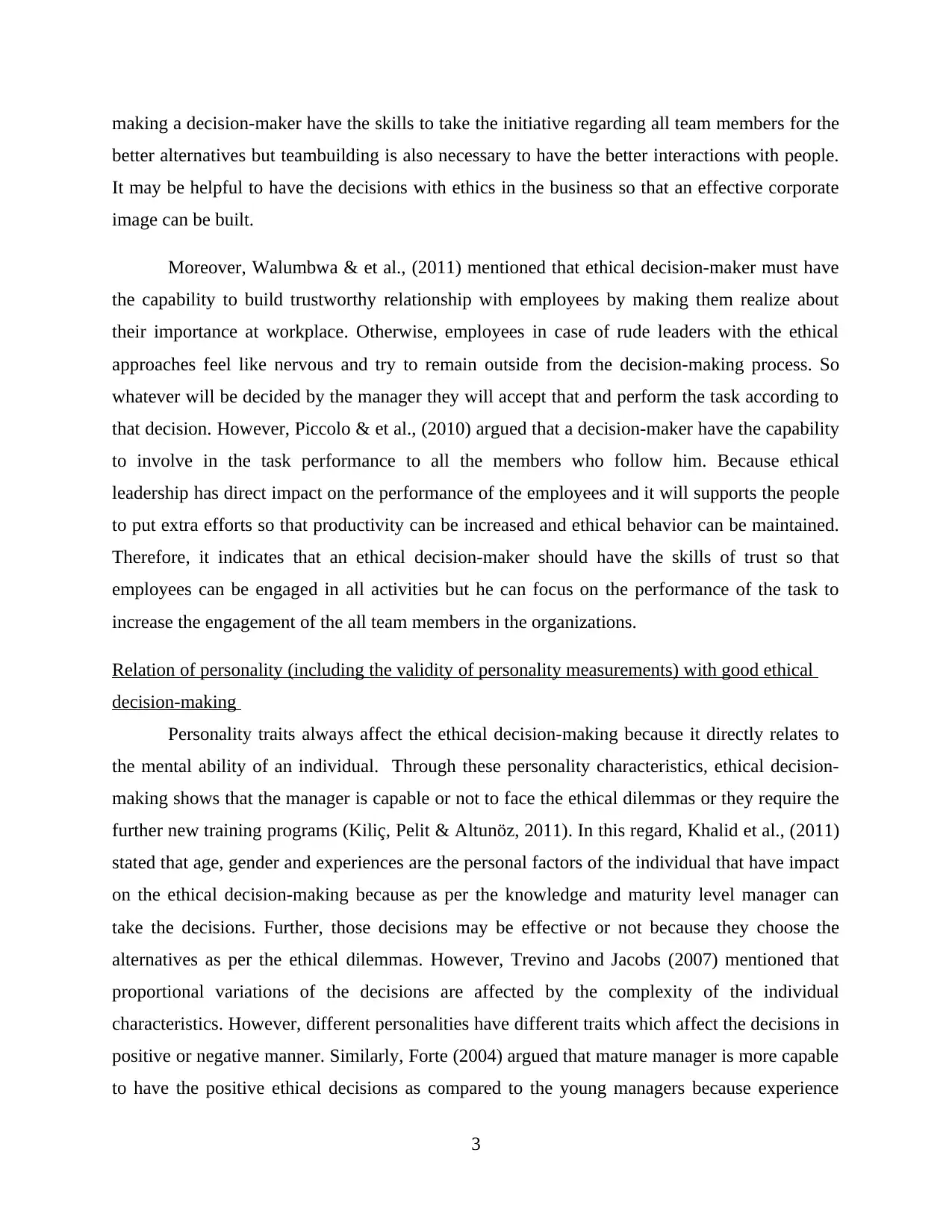
making a decision-maker have the skills to take the initiative regarding all team members for the
better alternatives but teambuilding is also necessary to have the better interactions with people.
It may be helpful to have the decisions with ethics in the business so that an effective corporate
image can be built.
Moreover, Walumbwa & et al., (2011) mentioned that ethical decision-maker must have
the capability to build trustworthy relationship with employees by making them realize about
their importance at workplace. Otherwise, employees in case of rude leaders with the ethical
approaches feel like nervous and try to remain outside from the decision-making process. So
whatever will be decided by the manager they will accept that and perform the task according to
that decision. However, Piccolo & et al., (2010) argued that a decision-maker have the capability
to involve in the task performance to all the members who follow him. Because ethical
leadership has direct impact on the performance of the employees and it will supports the people
to put extra efforts so that productivity can be increased and ethical behavior can be maintained.
Therefore, it indicates that an ethical decision-maker should have the skills of trust so that
employees can be engaged in all activities but he can focus on the performance of the task to
increase the engagement of the all team members in the organizations.
Relation of personality (including the validity of personality measurements) with good ethical
decision-making
Personality traits always affect the ethical decision-making because it directly relates to
the mental ability of an individual. Through these personality characteristics, ethical decision-
making shows that the manager is capable or not to face the ethical dilemmas or they require the
further new training programs (Kiliç, Pelit & Altunöz, 2011). In this regard, Khalid et al., (2011)
stated that age, gender and experiences are the personal factors of the individual that have impact
on the ethical decision-making because as per the knowledge and maturity level manager can
take the decisions. Further, those decisions may be effective or not because they choose the
alternatives as per the ethical dilemmas. However, Trevino and Jacobs (2007) mentioned that
proportional variations of the decisions are affected by the complexity of the individual
characteristics. However, different personalities have different traits which affect the decisions in
positive or negative manner. Similarly, Forte (2004) argued that mature manager is more capable
to have the positive ethical decisions as compared to the young managers because experience
3
better alternatives but teambuilding is also necessary to have the better interactions with people.
It may be helpful to have the decisions with ethics in the business so that an effective corporate
image can be built.
Moreover, Walumbwa & et al., (2011) mentioned that ethical decision-maker must have
the capability to build trustworthy relationship with employees by making them realize about
their importance at workplace. Otherwise, employees in case of rude leaders with the ethical
approaches feel like nervous and try to remain outside from the decision-making process. So
whatever will be decided by the manager they will accept that and perform the task according to
that decision. However, Piccolo & et al., (2010) argued that a decision-maker have the capability
to involve in the task performance to all the members who follow him. Because ethical
leadership has direct impact on the performance of the employees and it will supports the people
to put extra efforts so that productivity can be increased and ethical behavior can be maintained.
Therefore, it indicates that an ethical decision-maker should have the skills of trust so that
employees can be engaged in all activities but he can focus on the performance of the task to
increase the engagement of the all team members in the organizations.
Relation of personality (including the validity of personality measurements) with good ethical
decision-making
Personality traits always affect the ethical decision-making because it directly relates to
the mental ability of an individual. Through these personality characteristics, ethical decision-
making shows that the manager is capable or not to face the ethical dilemmas or they require the
further new training programs (Kiliç, Pelit & Altunöz, 2011). In this regard, Khalid et al., (2011)
stated that age, gender and experiences are the personal factors of the individual that have impact
on the ethical decision-making because as per the knowledge and maturity level manager can
take the decisions. Further, those decisions may be effective or not because they choose the
alternatives as per the ethical dilemmas. However, Trevino and Jacobs (2007) mentioned that
proportional variations of the decisions are affected by the complexity of the individual
characteristics. However, different personalities have different traits which affect the decisions in
positive or negative manner. Similarly, Forte (2004) argued that mature manager is more capable
to have the positive ethical decisions as compared to the young managers because experience
3
Secure Best Marks with AI Grader
Need help grading? Try our AI Grader for instant feedback on your assignments.
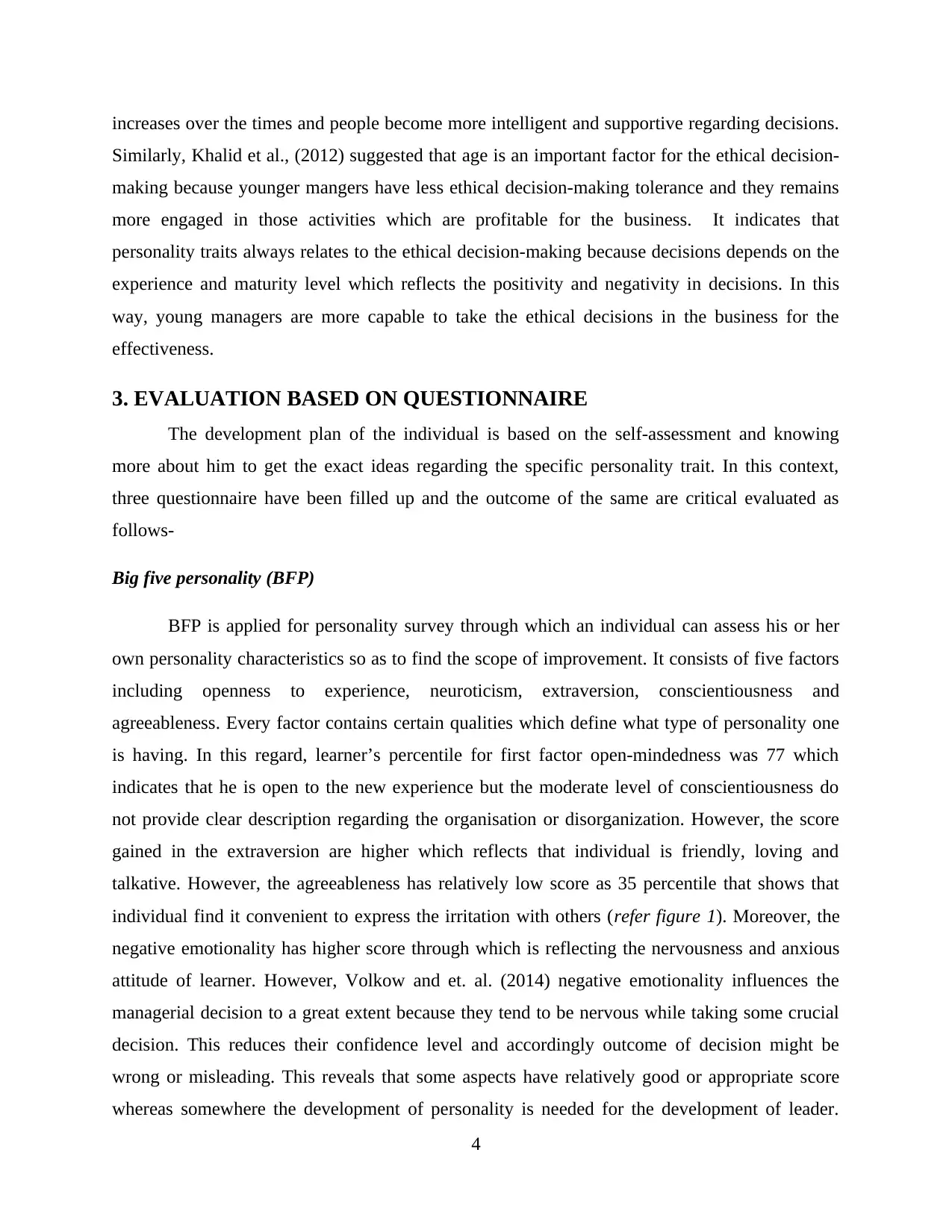
increases over the times and people become more intelligent and supportive regarding decisions.
Similarly, Khalid et al., (2012) suggested that age is an important factor for the ethical decision-
making because younger mangers have less ethical decision-making tolerance and they remains
more engaged in those activities which are profitable for the business. It indicates that
personality traits always relates to the ethical decision-making because decisions depends on the
experience and maturity level which reflects the positivity and negativity in decisions. In this
way, young managers are more capable to take the ethical decisions in the business for the
effectiveness.
3. EVALUATION BASED ON QUESTIONNAIRE
The development plan of the individual is based on the self-assessment and knowing
more about him to get the exact ideas regarding the specific personality trait. In this context,
three questionnaire have been filled up and the outcome of the same are critical evaluated as
follows-
Big five personality (BFP)
BFP is applied for personality survey through which an individual can assess his or her
own personality characteristics so as to find the scope of improvement. It consists of five factors
including openness to experience, neuroticism, extraversion, conscientiousness and
agreeableness. Every factor contains certain qualities which define what type of personality one
is having. In this regard, learner’s percentile for first factor open-mindedness was 77 which
indicates that he is open to the new experience but the moderate level of conscientiousness do
not provide clear description regarding the organisation or disorganization. However, the score
gained in the extraversion are higher which reflects that individual is friendly, loving and
talkative. However, the agreeableness has relatively low score as 35 percentile that shows that
individual find it convenient to express the irritation with others (refer figure 1). Moreover, the
negative emotionality has higher score through which is reflecting the nervousness and anxious
attitude of learner. However, Volkow and et. al. (2014) negative emotionality influences the
managerial decision to a great extent because they tend to be nervous while taking some crucial
decision. This reduces their confidence level and accordingly outcome of decision might be
wrong or misleading. This reveals that some aspects have relatively good or appropriate score
whereas somewhere the development of personality is needed for the development of leader.
4
Similarly, Khalid et al., (2012) suggested that age is an important factor for the ethical decision-
making because younger mangers have less ethical decision-making tolerance and they remains
more engaged in those activities which are profitable for the business. It indicates that
personality traits always relates to the ethical decision-making because decisions depends on the
experience and maturity level which reflects the positivity and negativity in decisions. In this
way, young managers are more capable to take the ethical decisions in the business for the
effectiveness.
3. EVALUATION BASED ON QUESTIONNAIRE
The development plan of the individual is based on the self-assessment and knowing
more about him to get the exact ideas regarding the specific personality trait. In this context,
three questionnaire have been filled up and the outcome of the same are critical evaluated as
follows-
Big five personality (BFP)
BFP is applied for personality survey through which an individual can assess his or her
own personality characteristics so as to find the scope of improvement. It consists of five factors
including openness to experience, neuroticism, extraversion, conscientiousness and
agreeableness. Every factor contains certain qualities which define what type of personality one
is having. In this regard, learner’s percentile for first factor open-mindedness was 77 which
indicates that he is open to the new experience but the moderate level of conscientiousness do
not provide clear description regarding the organisation or disorganization. However, the score
gained in the extraversion are higher which reflects that individual is friendly, loving and
talkative. However, the agreeableness has relatively low score as 35 percentile that shows that
individual find it convenient to express the irritation with others (refer figure 1). Moreover, the
negative emotionality has higher score through which is reflecting the nervousness and anxious
attitude of learner. However, Volkow and et. al. (2014) negative emotionality influences the
managerial decision to a great extent because they tend to be nervous while taking some crucial
decision. This reduces their confidence level and accordingly outcome of decision might be
wrong or misleading. This reveals that some aspects have relatively good or appropriate score
whereas somewhere the development of personality is needed for the development of leader.
4
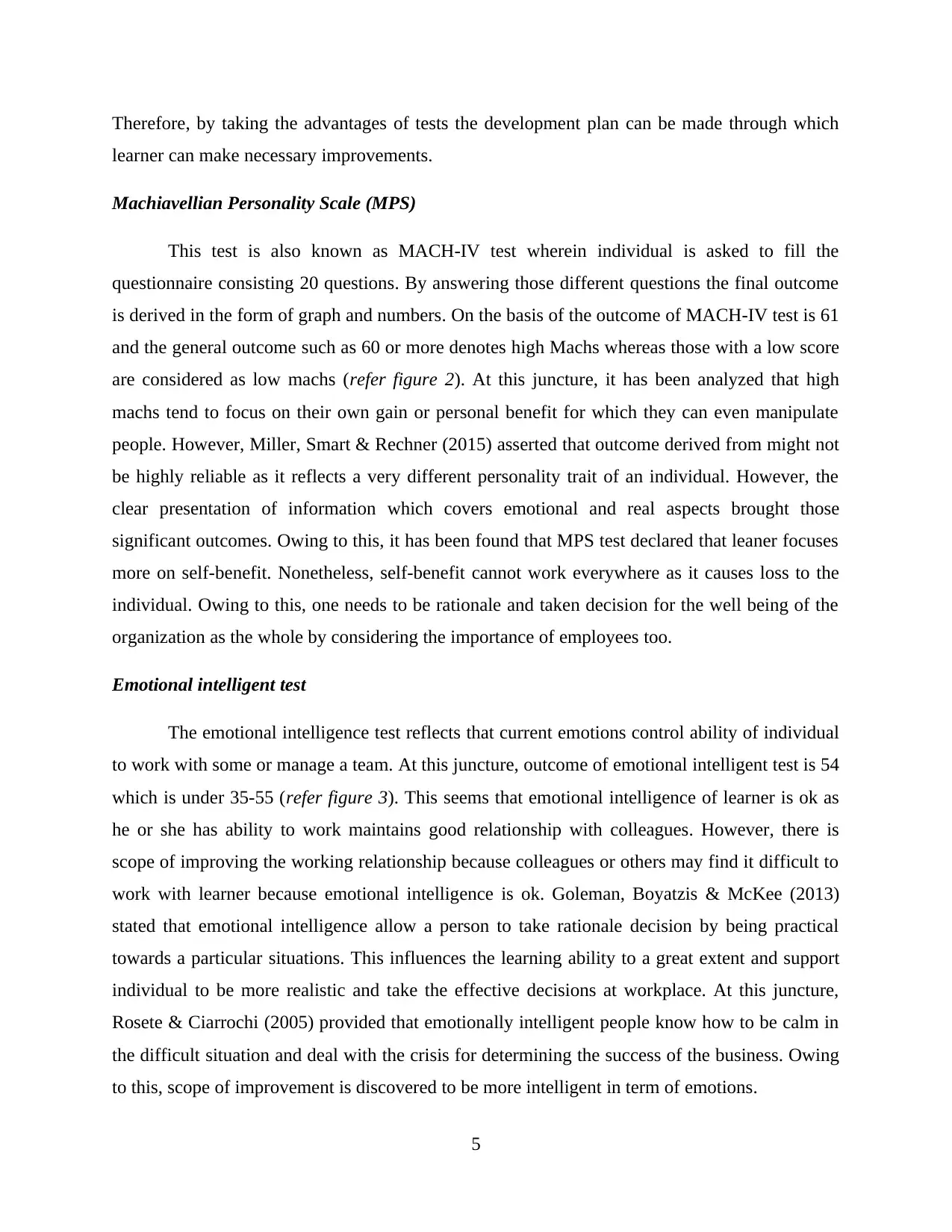
Therefore, by taking the advantages of tests the development plan can be made through which
learner can make necessary improvements.
Machiavellian Personality Scale (MPS)
This test is also known as MACH-IV test wherein individual is asked to fill the
questionnaire consisting 20 questions. By answering those different questions the final outcome
is derived in the form of graph and numbers. On the basis of the outcome of MACH-IV test is 61
and the general outcome such as 60 or more denotes high Machs whereas those with a low score
are considered as low machs (refer figure 2). At this juncture, it has been analyzed that high
machs tend to focus on their own gain or personal benefit for which they can even manipulate
people. However, Miller, Smart & Rechner (2015) asserted that outcome derived from might not
be highly reliable as it reflects a very different personality trait of an individual. However, the
clear presentation of information which covers emotional and real aspects brought those
significant outcomes. Owing to this, it has been found that MPS test declared that leaner focuses
more on self-benefit. Nonetheless, self-benefit cannot work everywhere as it causes loss to the
individual. Owing to this, one needs to be rationale and taken decision for the well being of the
organization as the whole by considering the importance of employees too.
Emotional intelligent test
The emotional intelligence test reflects that current emotions control ability of individual
to work with some or manage a team. At this juncture, outcome of emotional intelligent test is 54
which is under 35-55 (refer figure 3). This seems that emotional intelligence of learner is ok as
he or she has ability to work maintains good relationship with colleagues. However, there is
scope of improving the working relationship because colleagues or others may find it difficult to
work with learner because emotional intelligence is ok. Goleman, Boyatzis & McKee (2013)
stated that emotional intelligence allow a person to take rationale decision by being practical
towards a particular situations. This influences the learning ability to a great extent and support
individual to be more realistic and take the effective decisions at workplace. At this juncture,
Rosete & Ciarrochi (2005) provided that emotionally intelligent people know how to be calm in
the difficult situation and deal with the crisis for determining the success of the business. Owing
to this, scope of improvement is discovered to be more intelligent in term of emotions.
5
learner can make necessary improvements.
Machiavellian Personality Scale (MPS)
This test is also known as MACH-IV test wherein individual is asked to fill the
questionnaire consisting 20 questions. By answering those different questions the final outcome
is derived in the form of graph and numbers. On the basis of the outcome of MACH-IV test is 61
and the general outcome such as 60 or more denotes high Machs whereas those with a low score
are considered as low machs (refer figure 2). At this juncture, it has been analyzed that high
machs tend to focus on their own gain or personal benefit for which they can even manipulate
people. However, Miller, Smart & Rechner (2015) asserted that outcome derived from might not
be highly reliable as it reflects a very different personality trait of an individual. However, the
clear presentation of information which covers emotional and real aspects brought those
significant outcomes. Owing to this, it has been found that MPS test declared that leaner focuses
more on self-benefit. Nonetheless, self-benefit cannot work everywhere as it causes loss to the
individual. Owing to this, one needs to be rationale and taken decision for the well being of the
organization as the whole by considering the importance of employees too.
Emotional intelligent test
The emotional intelligence test reflects that current emotions control ability of individual
to work with some or manage a team. At this juncture, outcome of emotional intelligent test is 54
which is under 35-55 (refer figure 3). This seems that emotional intelligence of learner is ok as
he or she has ability to work maintains good relationship with colleagues. However, there is
scope of improving the working relationship because colleagues or others may find it difficult to
work with learner because emotional intelligence is ok. Goleman, Boyatzis & McKee (2013)
stated that emotional intelligence allow a person to take rationale decision by being practical
towards a particular situations. This influences the learning ability to a great extent and support
individual to be more realistic and take the effective decisions at workplace. At this juncture,
Rosete & Ciarrochi (2005) provided that emotionally intelligent people know how to be calm in
the difficult situation and deal with the crisis for determining the success of the business. Owing
to this, scope of improvement is discovered to be more intelligent in term of emotions.
5
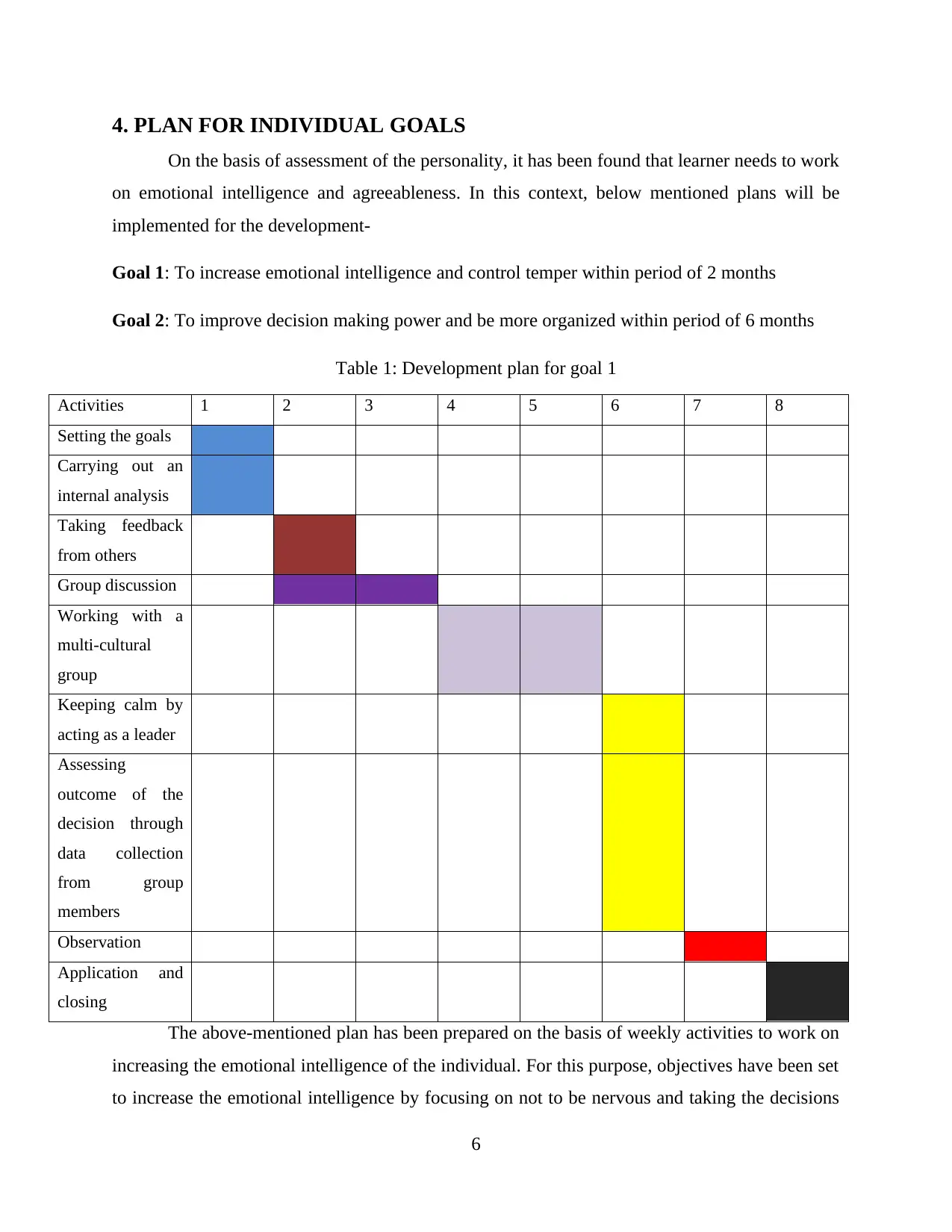
4. PLAN FOR INDIVIDUAL GOALS
On the basis of assessment of the personality, it has been found that learner needs to work
on emotional intelligence and agreeableness. In this context, below mentioned plans will be
implemented for the development-
Goal 1: To increase emotional intelligence and control temper within period of 2 months
Goal 2: To improve decision making power and be more organized within period of 6 months
Table 1: Development plan for goal 1
Activities 1 2 3 4 5 6 7 8
Setting the goals
Carrying out an
internal analysis
Taking feedback
from others
Group discussion
Working with a
multi-cultural
group
Keeping calm by
acting as a leader
Assessing
outcome of the
decision through
data collection
from group
members
Observation
Application and
closing
The above-mentioned plan has been prepared on the basis of weekly activities to work on
increasing the emotional intelligence of the individual. For this purpose, objectives have been set
to increase the emotional intelligence by focusing on not to be nervous and taking the decisions
6
On the basis of assessment of the personality, it has been found that learner needs to work
on emotional intelligence and agreeableness. In this context, below mentioned plans will be
implemented for the development-
Goal 1: To increase emotional intelligence and control temper within period of 2 months
Goal 2: To improve decision making power and be more organized within period of 6 months
Table 1: Development plan for goal 1
Activities 1 2 3 4 5 6 7 8
Setting the goals
Carrying out an
internal analysis
Taking feedback
from others
Group discussion
Working with a
multi-cultural
group
Keeping calm by
acting as a leader
Assessing
outcome of the
decision through
data collection
from group
members
Observation
Application and
closing
The above-mentioned plan has been prepared on the basis of weekly activities to work on
increasing the emotional intelligence of the individual. For this purpose, objectives have been set
to increase the emotional intelligence by focusing on not to be nervous and taking the decisions
6
Paraphrase This Document
Need a fresh take? Get an instant paraphrase of this document with our AI Paraphraser
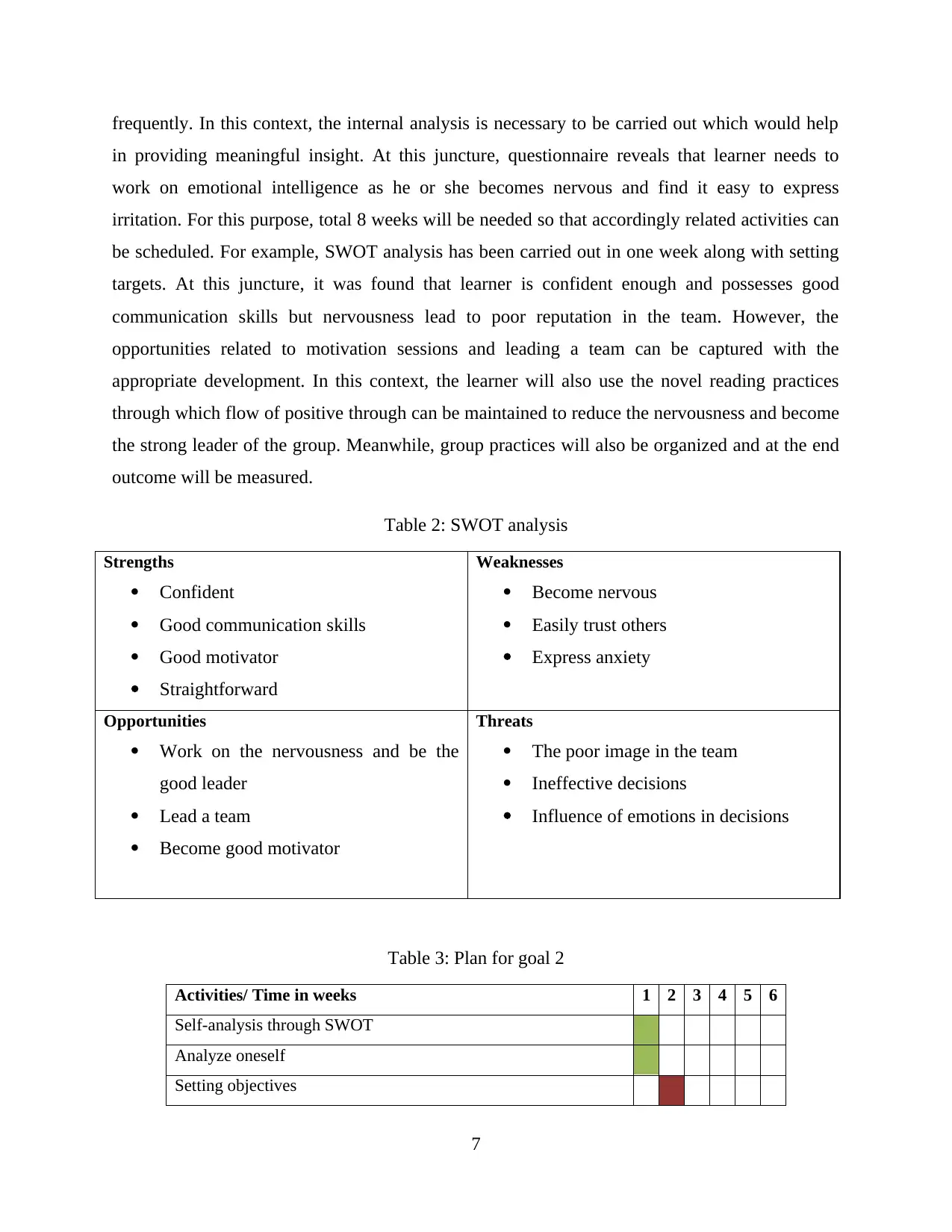
frequently. In this context, the internal analysis is necessary to be carried out which would help
in providing meaningful insight. At this juncture, questionnaire reveals that learner needs to
work on emotional intelligence as he or she becomes nervous and find it easy to express
irritation. For this purpose, total 8 weeks will be needed so that accordingly related activities can
be scheduled. For example, SWOT analysis has been carried out in one week along with setting
targets. At this juncture, it was found that learner is confident enough and possesses good
communication skills but nervousness lead to poor reputation in the team. However, the
opportunities related to motivation sessions and leading a team can be captured with the
appropriate development. In this context, the learner will also use the novel reading practices
through which flow of positive through can be maintained to reduce the nervousness and become
the strong leader of the group. Meanwhile, group practices will also be organized and at the end
outcome will be measured.
Table 2: SWOT analysis
Strengths
Confident
Good communication skills
Good motivator
Straightforward
Weaknesses
Become nervous
Easily trust others
Express anxiety
Opportunities
Work on the nervousness and be the
good leader
Lead a team
Become good motivator
Threats
The poor image in the team
Ineffective decisions
Influence of emotions in decisions
Table 3: Plan for goal 2
Activities/ Time in weeks 1 2 3 4 5 6
Self-analysis through SWOT
Analyze oneself
Setting objectives
7
in providing meaningful insight. At this juncture, questionnaire reveals that learner needs to
work on emotional intelligence as he or she becomes nervous and find it easy to express
irritation. For this purpose, total 8 weeks will be needed so that accordingly related activities can
be scheduled. For example, SWOT analysis has been carried out in one week along with setting
targets. At this juncture, it was found that learner is confident enough and possesses good
communication skills but nervousness lead to poor reputation in the team. However, the
opportunities related to motivation sessions and leading a team can be captured with the
appropriate development. In this context, the learner will also use the novel reading practices
through which flow of positive through can be maintained to reduce the nervousness and become
the strong leader of the group. Meanwhile, group practices will also be organized and at the end
outcome will be measured.
Table 2: SWOT analysis
Strengths
Confident
Good communication skills
Good motivator
Straightforward
Weaknesses
Become nervous
Easily trust others
Express anxiety
Opportunities
Work on the nervousness and be the
good leader
Lead a team
Become good motivator
Threats
The poor image in the team
Ineffective decisions
Influence of emotions in decisions
Table 3: Plan for goal 2
Activities/ Time in weeks 1 2 3 4 5 6
Self-analysis through SWOT
Analyze oneself
Setting objectives
7
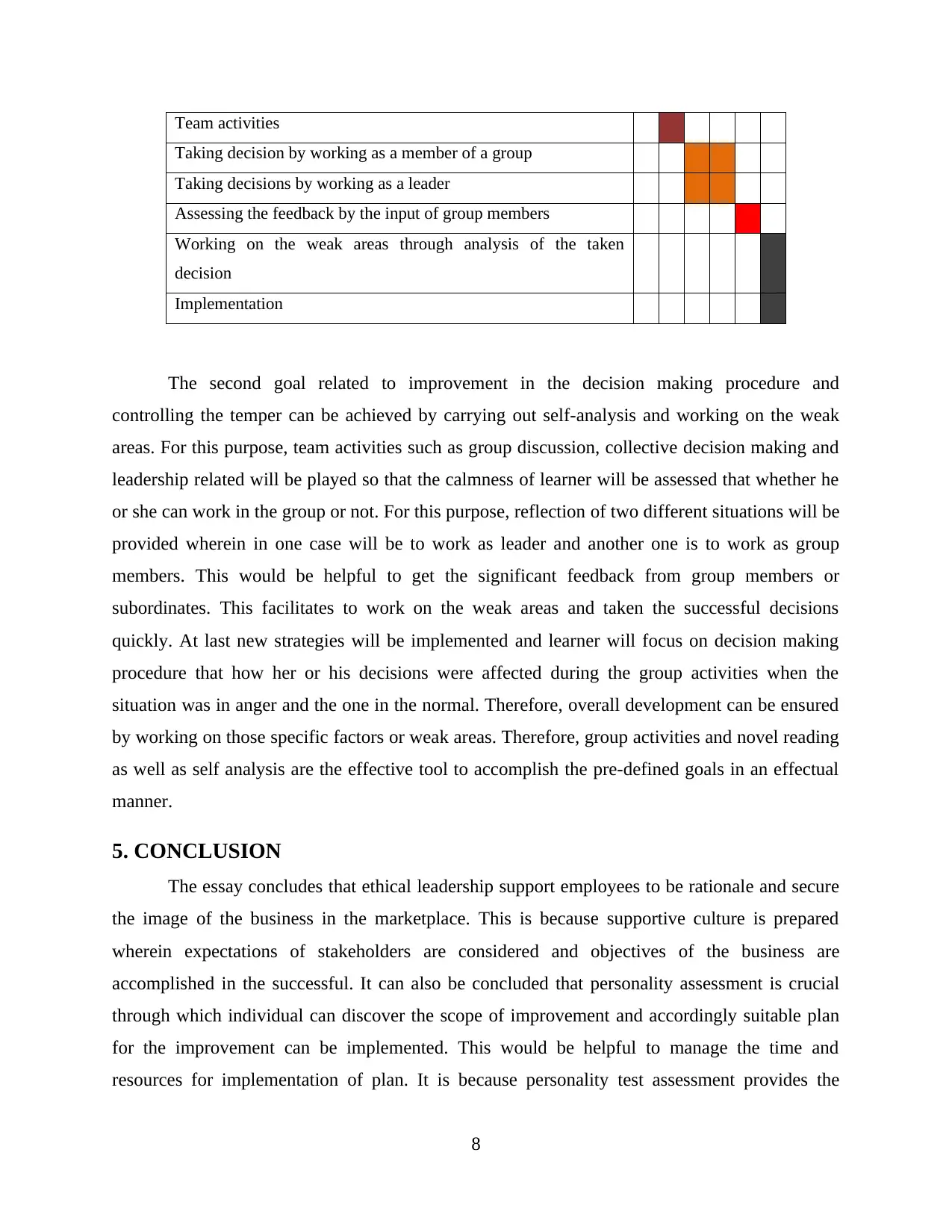
Team activities
Taking decision by working as a member of a group
Taking decisions by working as a leader
Assessing the feedback by the input of group members
Working on the weak areas through analysis of the taken
decision
Implementation
The second goal related to improvement in the decision making procedure and
controlling the temper can be achieved by carrying out self-analysis and working on the weak
areas. For this purpose, team activities such as group discussion, collective decision making and
leadership related will be played so that the calmness of learner will be assessed that whether he
or she can work in the group or not. For this purpose, reflection of two different situations will be
provided wherein in one case will be to work as leader and another one is to work as group
members. This would be helpful to get the significant feedback from group members or
subordinates. This facilitates to work on the weak areas and taken the successful decisions
quickly. At last new strategies will be implemented and learner will focus on decision making
procedure that how her or his decisions were affected during the group activities when the
situation was in anger and the one in the normal. Therefore, overall development can be ensured
by working on those specific factors or weak areas. Therefore, group activities and novel reading
as well as self analysis are the effective tool to accomplish the pre-defined goals in an effectual
manner.
5. CONCLUSION
The essay concludes that ethical leadership support employees to be rationale and secure
the image of the business in the marketplace. This is because supportive culture is prepared
wherein expectations of stakeholders are considered and objectives of the business are
accomplished in the successful. It can also be concluded that personality assessment is crucial
through which individual can discover the scope of improvement and accordingly suitable plan
for the improvement can be implemented. This would be helpful to manage the time and
resources for implementation of plan. It is because personality test assessment provides the
8
Taking decision by working as a member of a group
Taking decisions by working as a leader
Assessing the feedback by the input of group members
Working on the weak areas through analysis of the taken
decision
Implementation
The second goal related to improvement in the decision making procedure and
controlling the temper can be achieved by carrying out self-analysis and working on the weak
areas. For this purpose, team activities such as group discussion, collective decision making and
leadership related will be played so that the calmness of learner will be assessed that whether he
or she can work in the group or not. For this purpose, reflection of two different situations will be
provided wherein in one case will be to work as leader and another one is to work as group
members. This would be helpful to get the significant feedback from group members or
subordinates. This facilitates to work on the weak areas and taken the successful decisions
quickly. At last new strategies will be implemented and learner will focus on decision making
procedure that how her or his decisions were affected during the group activities when the
situation was in anger and the one in the normal. Therefore, overall development can be ensured
by working on those specific factors or weak areas. Therefore, group activities and novel reading
as well as self analysis are the effective tool to accomplish the pre-defined goals in an effectual
manner.
5. CONCLUSION
The essay concludes that ethical leadership support employees to be rationale and secure
the image of the business in the marketplace. This is because supportive culture is prepared
wherein expectations of stakeholders are considered and objectives of the business are
accomplished in the successful. It can also be concluded that personality assessment is crucial
through which individual can discover the scope of improvement and accordingly suitable plan
for the improvement can be implemented. This would be helpful to manage the time and
resources for implementation of plan. It is because personality test assessment provides the
8
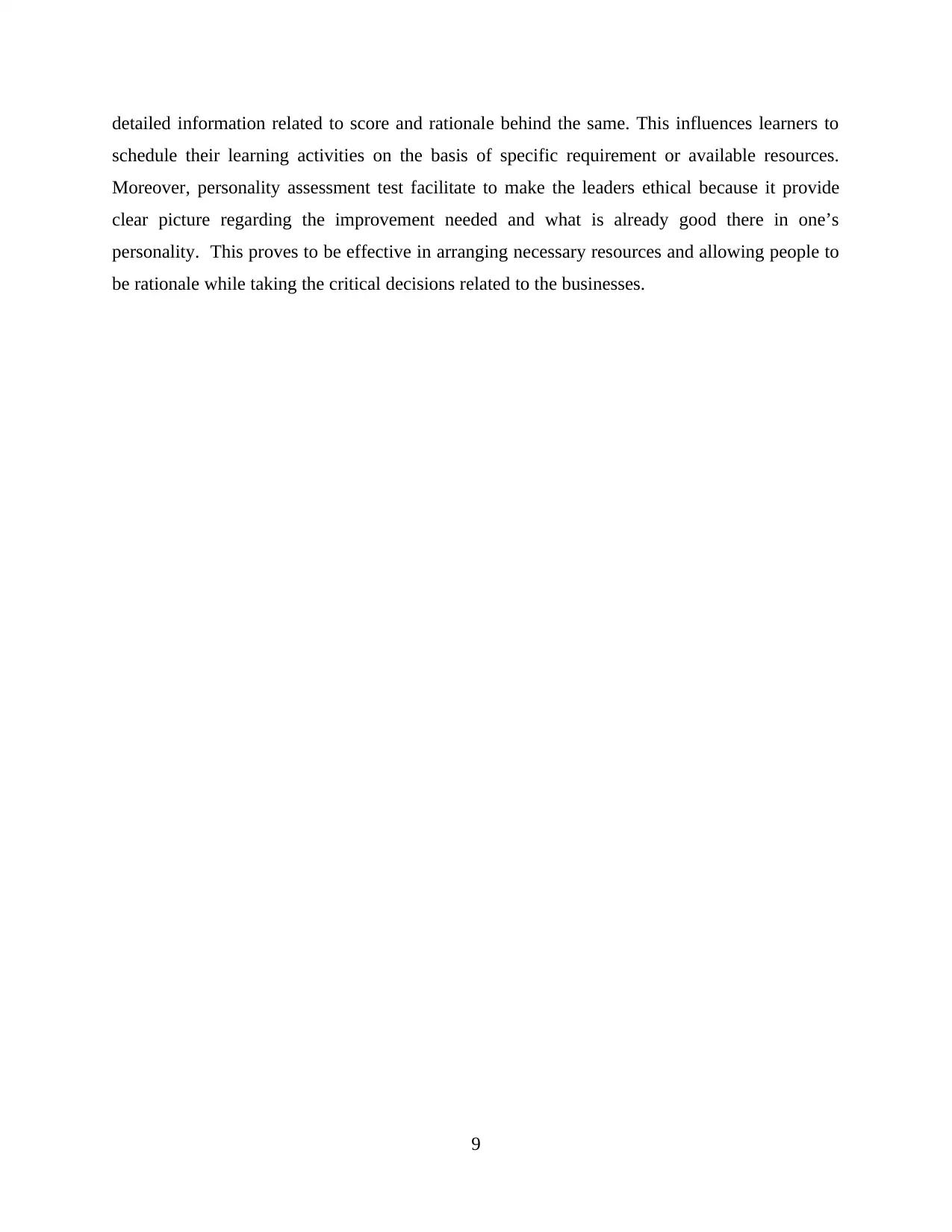
detailed information related to score and rationale behind the same. This influences learners to
schedule their learning activities on the basis of specific requirement or available resources.
Moreover, personality assessment test facilitate to make the leaders ethical because it provide
clear picture regarding the improvement needed and what is already good there in one’s
personality. This proves to be effective in arranging necessary resources and allowing people to
be rationale while taking the critical decisions related to the businesses.
9
schedule their learning activities on the basis of specific requirement or available resources.
Moreover, personality assessment test facilitate to make the leaders ethical because it provide
clear picture regarding the improvement needed and what is already good there in one’s
personality. This proves to be effective in arranging necessary resources and allowing people to
be rationale while taking the critical decisions related to the businesses.
9
Secure Best Marks with AI Grader
Need help grading? Try our AI Grader for instant feedback on your assignments.
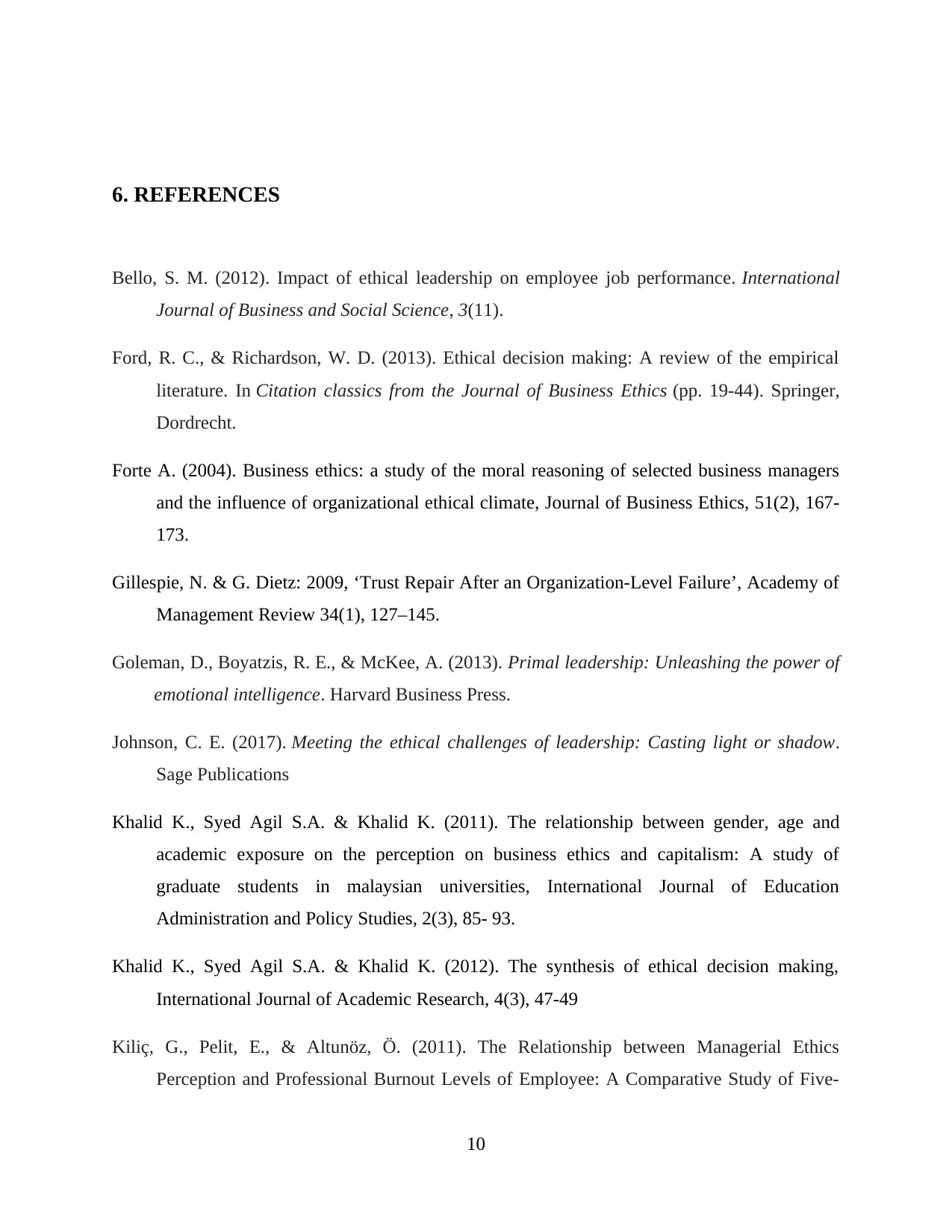
6. REFERENCES
Bello, S. M. (2012). Impact of ethical leadership on employee job performance. International
Journal of Business and Social Science, 3(11).
Ford, R. C., & Richardson, W. D. (2013). Ethical decision making: A review of the empirical
literature. In Citation classics from the Journal of Business Ethics (pp. 19-44). Springer,
Dordrecht.
Forte A. (2004). Business ethics: a study of the moral reasoning of selected business managers
and the influence of organizational ethical climate, Journal of Business Ethics, 51(2), 167-
173.
Gillespie, N. & G. Dietz: 2009, ‘Trust Repair After an Organization-Level Failure’, Academy of
Management Review 34(1), 127–145.
Goleman, D., Boyatzis, R. E., & McKee, A. (2013). Primal leadership: Unleashing the power of
emotional intelligence. Harvard Business Press.
Johnson, C. E. (2017). Meeting the ethical challenges of leadership: Casting light or shadow.
Sage Publications
Khalid K., Syed Agil S.A. & Khalid K. (2011). The relationship between gender, age and
academic exposure on the perception on business ethics and capitalism: A study of
graduate students in malaysian universities, International Journal of Education
Administration and Policy Studies, 2(3), 85- 93.
Khalid K., Syed Agil S.A. & Khalid K. (2012). The synthesis of ethical decision making,
International Journal of Academic Research, 4(3), 47-49
Kiliç, G., Pelit, E., & Altunöz, Ö. (2011). The Relationship between Managerial Ethics
Perception and Professional Burnout Levels of Employee: A Comparative Study of Five-
10
Bello, S. M. (2012). Impact of ethical leadership on employee job performance. International
Journal of Business and Social Science, 3(11).
Ford, R. C., & Richardson, W. D. (2013). Ethical decision making: A review of the empirical
literature. In Citation classics from the Journal of Business Ethics (pp. 19-44). Springer,
Dordrecht.
Forte A. (2004). Business ethics: a study of the moral reasoning of selected business managers
and the influence of organizational ethical climate, Journal of Business Ethics, 51(2), 167-
173.
Gillespie, N. & G. Dietz: 2009, ‘Trust Repair After an Organization-Level Failure’, Academy of
Management Review 34(1), 127–145.
Goleman, D., Boyatzis, R. E., & McKee, A. (2013). Primal leadership: Unleashing the power of
emotional intelligence. Harvard Business Press.
Johnson, C. E. (2017). Meeting the ethical challenges of leadership: Casting light or shadow.
Sage Publications
Khalid K., Syed Agil S.A. & Khalid K. (2011). The relationship between gender, age and
academic exposure on the perception on business ethics and capitalism: A study of
graduate students in malaysian universities, International Journal of Education
Administration and Policy Studies, 2(3), 85- 93.
Khalid K., Syed Agil S.A. & Khalid K. (2012). The synthesis of ethical decision making,
International Journal of Academic Research, 4(3), 47-49
Kiliç, G., Pelit, E., & Altunöz, Ö. (2011). The Relationship between Managerial Ethics
Perception and Professional Burnout Levels of Employee: A Comparative Study of Five-
10
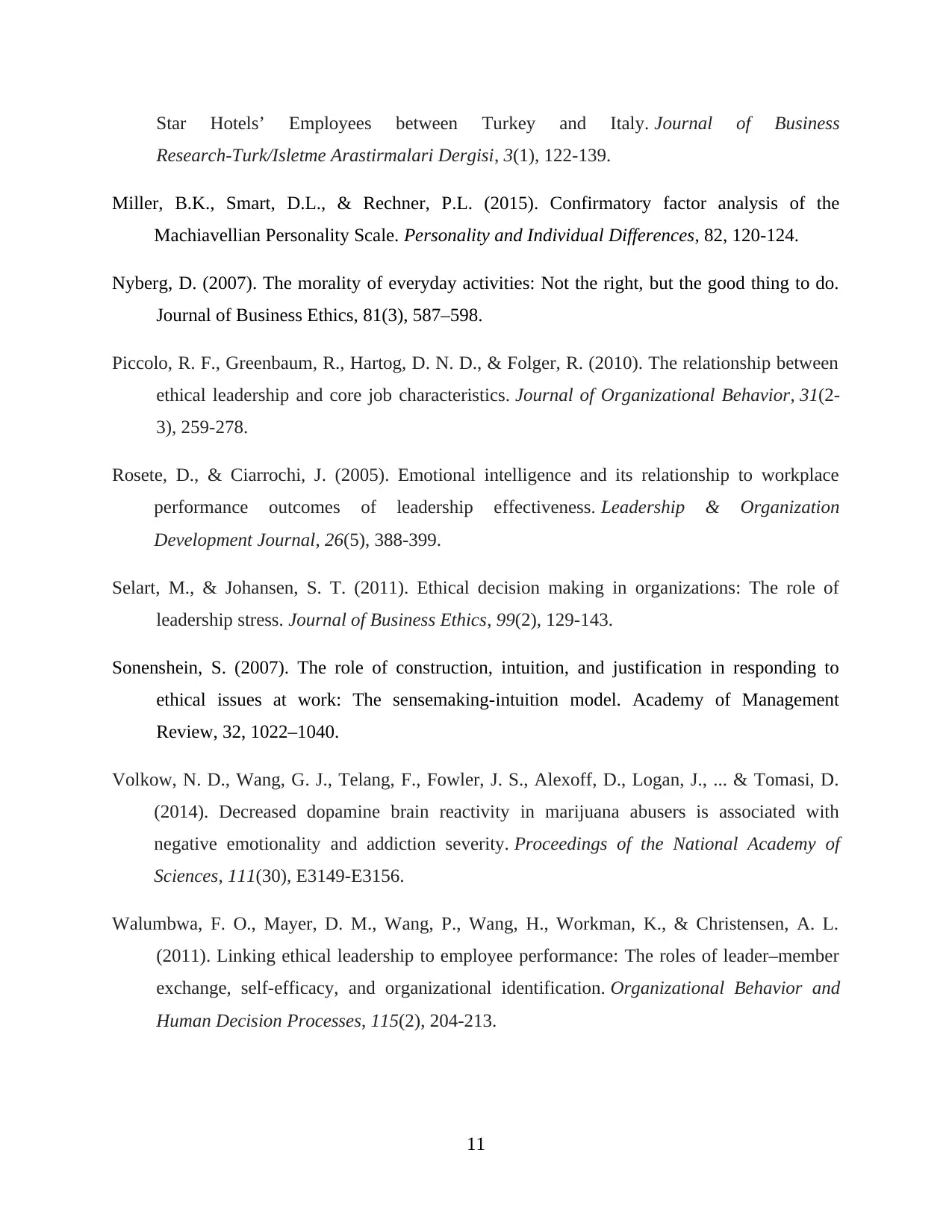
Star Hotels’ Employees between Turkey and Italy. Journal of Business
Research-Turk/Isletme Arastirmalari Dergisi, 3(1), 122-139.
Miller, B.K., Smart, D.L., & Rechner, P.L. (2015). Confirmatory factor analysis of the
Machiavellian Personality Scale. Personality and Individual Differences, 82, 120-124.
Nyberg, D. (2007). The morality of everyday activities: Not the right, but the good thing to do.
Journal of Business Ethics, 81(3), 587–598.
Piccolo, R. F., Greenbaum, R., Hartog, D. N. D., & Folger, R. (2010). The relationship between
ethical leadership and core job characteristics. Journal of Organizational Behavior, 31(2‐
3), 259-278.
Rosete, D., & Ciarrochi, J. (2005). Emotional intelligence and its relationship to workplace
performance outcomes of leadership effectiveness. Leadership & Organization
Development Journal, 26(5), 388-399.
Selart, M., & Johansen, S. T. (2011). Ethical decision making in organizations: The role of
leadership stress. Journal of Business Ethics, 99(2), 129-143.
Sonenshein, S. (2007). The role of construction, intuition, and justification in responding to
ethical issues at work: The sensemaking-intuition model. Academy of Management
Review, 32, 1022–1040.
Volkow, N. D., Wang, G. J., Telang, F., Fowler, J. S., Alexoff, D., Logan, J., ... & Tomasi, D.
(2014). Decreased dopamine brain reactivity in marijuana abusers is associated with
negative emotionality and addiction severity. Proceedings of the National Academy of
Sciences, 111(30), E3149-E3156.
Walumbwa, F. O., Mayer, D. M., Wang, P., Wang, H., Workman, K., & Christensen, A. L.
(2011). Linking ethical leadership to employee performance: The roles of leader–member
exchange, self-efficacy, and organizational identification. Organizational Behavior and
Human Decision Processes, 115(2), 204-213.
11
Research-Turk/Isletme Arastirmalari Dergisi, 3(1), 122-139.
Miller, B.K., Smart, D.L., & Rechner, P.L. (2015). Confirmatory factor analysis of the
Machiavellian Personality Scale. Personality and Individual Differences, 82, 120-124.
Nyberg, D. (2007). The morality of everyday activities: Not the right, but the good thing to do.
Journal of Business Ethics, 81(3), 587–598.
Piccolo, R. F., Greenbaum, R., Hartog, D. N. D., & Folger, R. (2010). The relationship between
ethical leadership and core job characteristics. Journal of Organizational Behavior, 31(2‐
3), 259-278.
Rosete, D., & Ciarrochi, J. (2005). Emotional intelligence and its relationship to workplace
performance outcomes of leadership effectiveness. Leadership & Organization
Development Journal, 26(5), 388-399.
Selart, M., & Johansen, S. T. (2011). Ethical decision making in organizations: The role of
leadership stress. Journal of Business Ethics, 99(2), 129-143.
Sonenshein, S. (2007). The role of construction, intuition, and justification in responding to
ethical issues at work: The sensemaking-intuition model. Academy of Management
Review, 32, 1022–1040.
Volkow, N. D., Wang, G. J., Telang, F., Fowler, J. S., Alexoff, D., Logan, J., ... & Tomasi, D.
(2014). Decreased dopamine brain reactivity in marijuana abusers is associated with
negative emotionality and addiction severity. Proceedings of the National Academy of
Sciences, 111(30), E3149-E3156.
Walumbwa, F. O., Mayer, D. M., Wang, P., Wang, H., Workman, K., & Christensen, A. L.
(2011). Linking ethical leadership to employee performance: The roles of leader–member
exchange, self-efficacy, and organizational identification. Organizational Behavior and
Human Decision Processes, 115(2), 204-213.
11
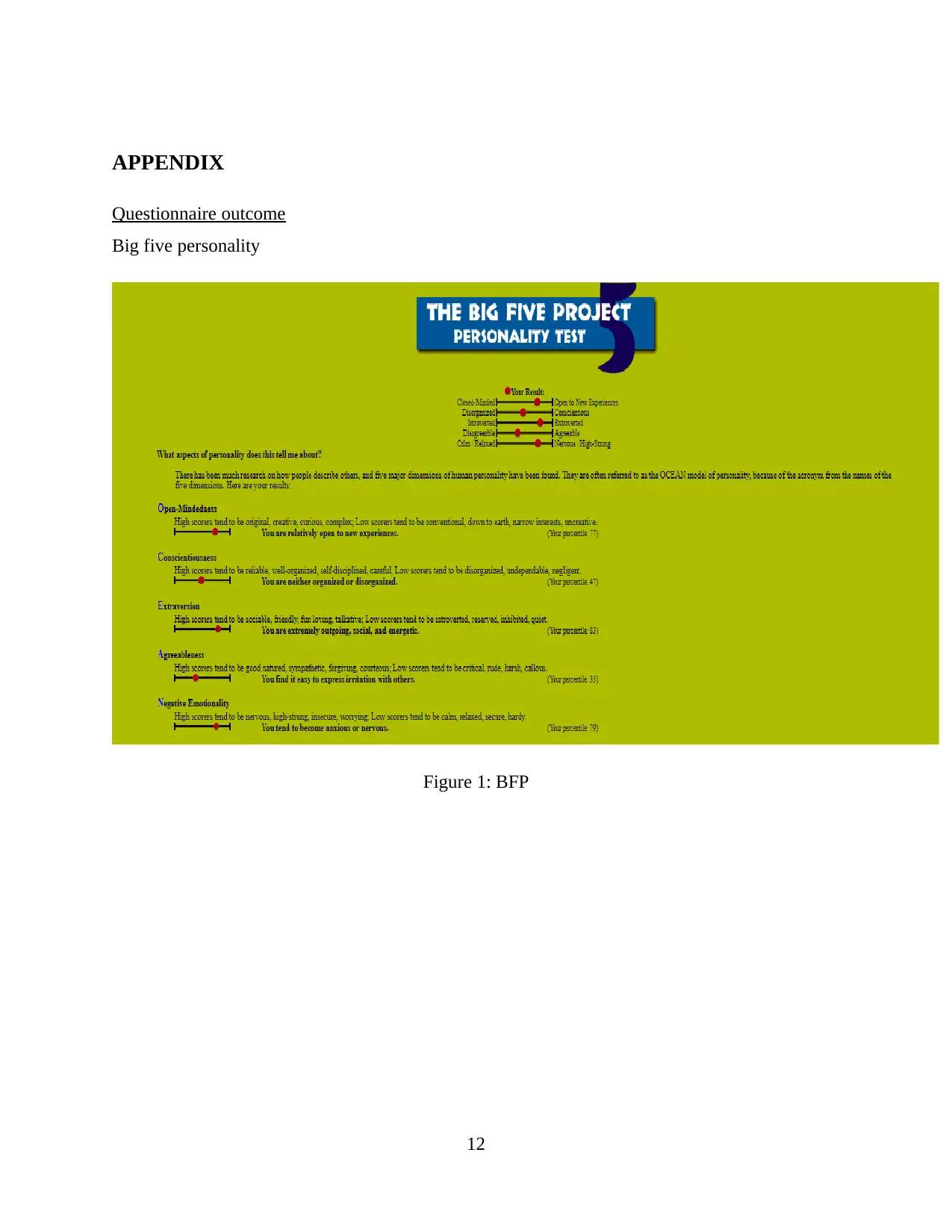
APPENDIX
Questionnaire outcome
Big five personality
Figure 1: BFP
12
Questionnaire outcome
Big five personality
Figure 1: BFP
12
Paraphrase This Document
Need a fresh take? Get an instant paraphrase of this document with our AI Paraphraser
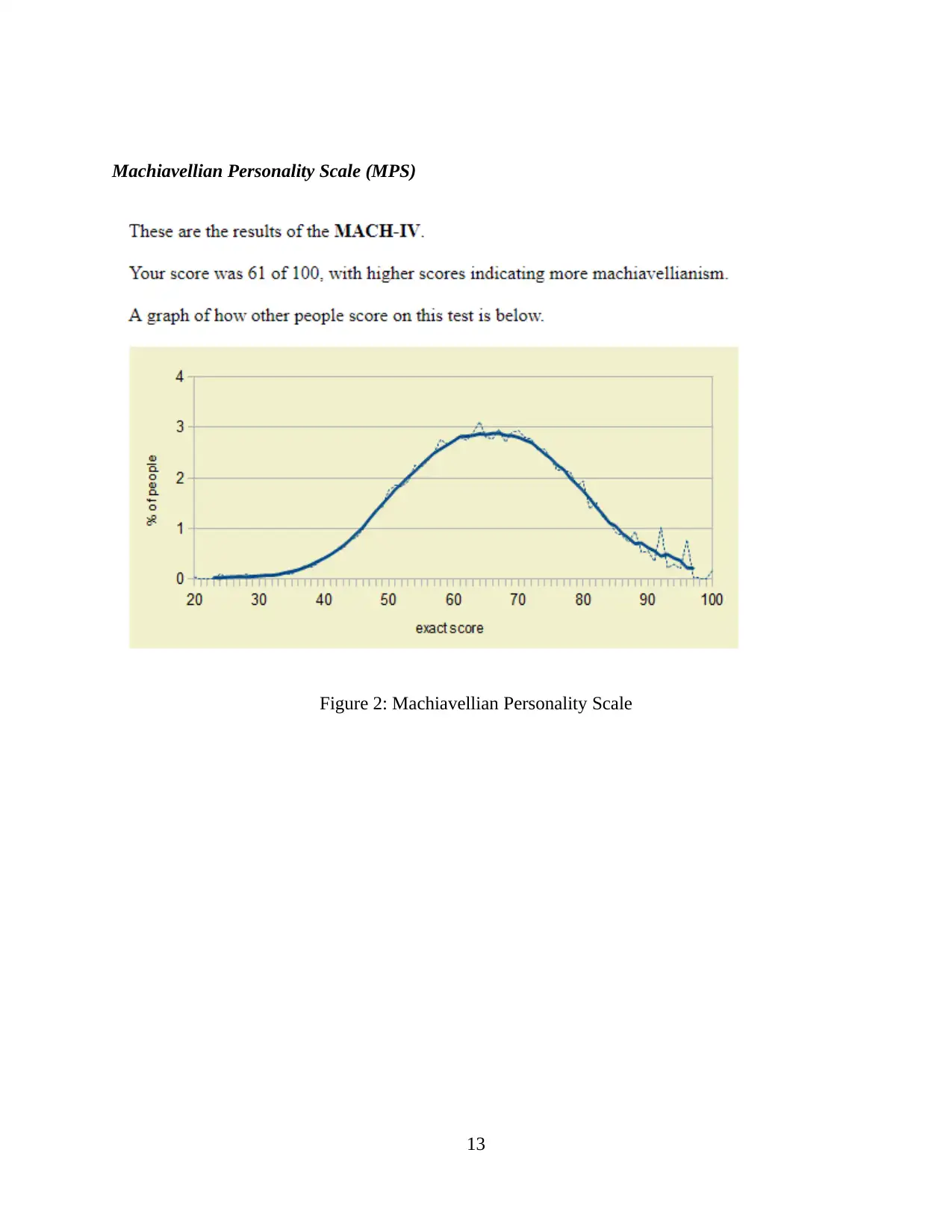
Machiavellian Personality Scale (MPS)
Figure 2: Machiavellian Personality Scale
13
Figure 2: Machiavellian Personality Scale
13
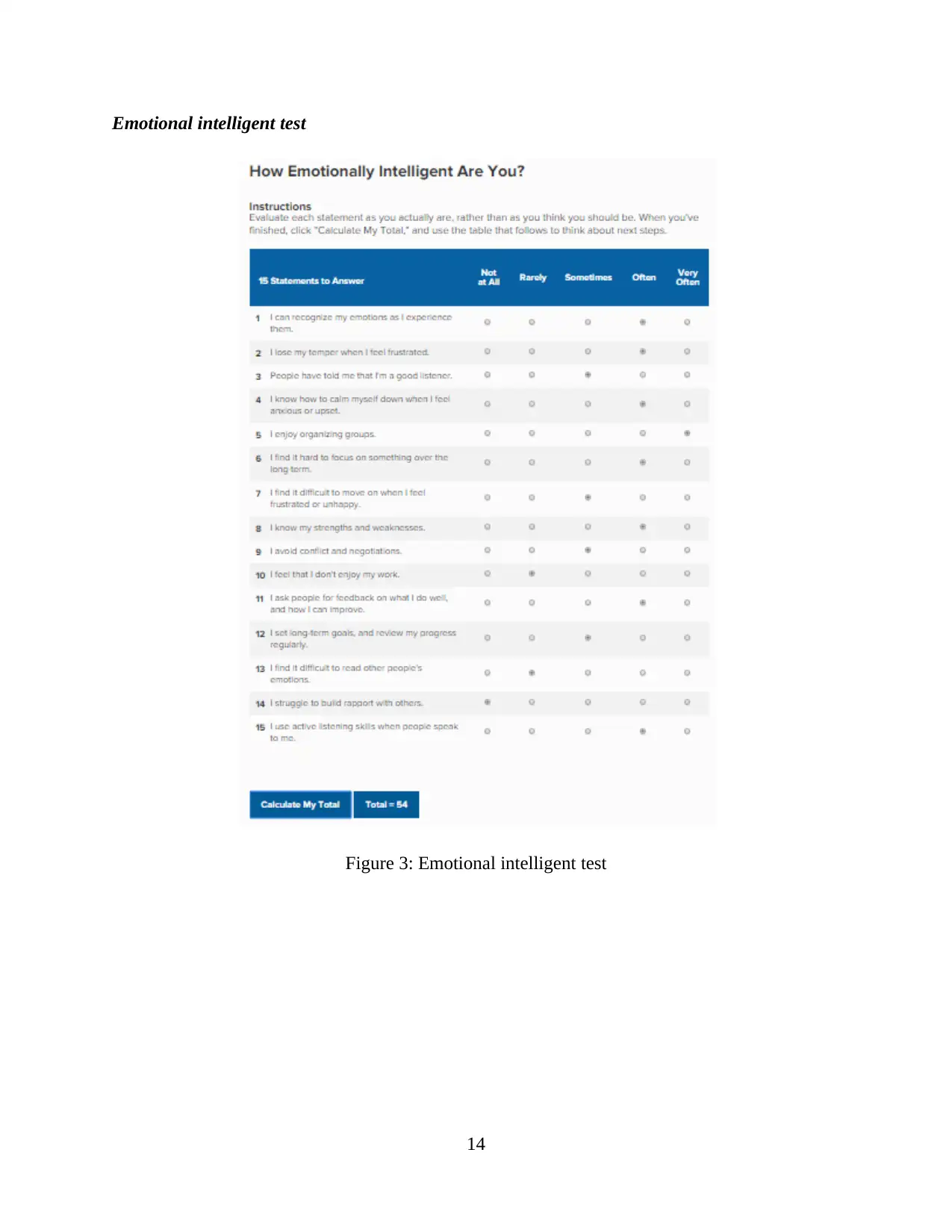
Emotional intelligent test
Figure 3: Emotional intelligent test
14
Figure 3: Emotional intelligent test
14
1 out of 15
Related Documents
Your All-in-One AI-Powered Toolkit for Academic Success.
+13062052269
info@desklib.com
Available 24*7 on WhatsApp / Email
![[object Object]](/_next/static/media/star-bottom.7253800d.svg)
Unlock your academic potential
© 2024 | Zucol Services PVT LTD | All rights reserved.



